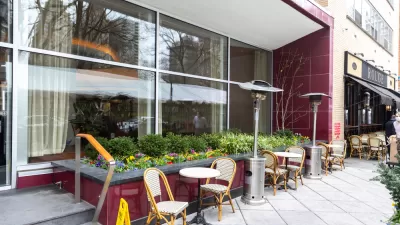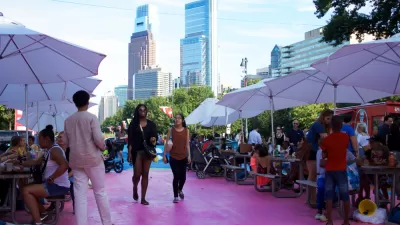Some restaurants have found ways to circumvent the expense of liquor licenses in Philadelphia by opening pop-up beer gardens operating under a much, much cheaper catering permit. Cue state legislation to curb the practice.
"A quartet of state lawmakers are pushing back on Philly's pop-up [beer] gardens, taking issue with something called an off-premise catering permit that allows vendors to 'cater' alcohol sales at these pop-up gardens for months at a time," reports Jon Geeting.
The key to the controversy is the Prohibition-era policy of county quotas, according to Geeting. "The state caps R licenses at 1 license per 3,000 people per county, and the number of licenses in Philadelphia has actually been declining as the population has grown, as many have been taken out of circulation due to liens and violations."
Washington D.C.'s liquor licenses sell for $9,000-11,000, so Philadelphia's $85,000 liquor licenses constitute a significant barrier to entry into the bar and restaurant business by comparison.
"That's what makes the pop-up beer gardens so innovative," explains Geeting, "a restaurant with a liquor license can obtain an off-site catering permit for $500 to extend that license to another location, and cater one of these temporary outdoor bars for a few months in the summer and fall. The legality of a single permit holder serving the same beer garden for months at a time is what state lawmakers are contesting…"
FULL STORY: The Prohibition-era policy driving the political scuffle over pop-up beer gardens

Maui's Vacation Rental Debate Turns Ugly
Verbal attacks, misinformation campaigns and fistfights plague a high-stakes debate to convert thousands of vacation rentals into long-term housing.

Planetizen Federal Action Tracker
A weekly monitor of how Trump’s orders and actions are impacting planners and planning in America.

In Urban Planning, AI Prompting Could be the New Design Thinking
Creativity has long been key to great urban design. What if we see AI as our new creative partner?

King County Supportive Housing Program Offers Hope for Unhoused Residents
The county is taking a ‘Housing First’ approach that prioritizes getting people into housing, then offering wraparound supportive services.

Researchers Use AI to Get Clearer Picture of US Housing
Analysts are using artificial intelligence to supercharge their research by allowing them to comb through data faster. Though these AI tools can be error prone, they save time and housing researchers are optimistic about the future.

Making Shared Micromobility More Inclusive
Cities and shared mobility system operators can do more to include people with disabilities in planning and operations, per a new report.
Urban Design for Planners 1: Software Tools
This six-course series explores essential urban design concepts using open source software and equips planners with the tools they need to participate fully in the urban design process.
Planning for Universal Design
Learn the tools for implementing Universal Design in planning regulations.
planning NEXT
Appalachian Highlands Housing Partners
Mpact (founded as Rail~Volution)
City of Camden Redevelopment Agency
City of Astoria
City of Portland
City of Laramie




























